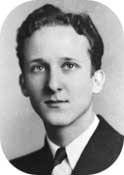Disenchantment with Organized Religion
David's early Christian instruction was based in the churches. Yet as he became more involved in preaching the Gospel, he became increasingly convinced that many churches were not interested in fulfilling the Great Commission that Christ had given His disciples, to "go into all the world and preach the Gospel to every creature" (Mark 16:15).

"From childhood I had this feeling that something was wrong with the churches. We just weren't reaching the vast majority of the people"
It was a dilemma that David would grapple with for several years. He longed to serve God, and yet the only place where it seemed he could do this was within a church system that he saw as largely complacent and disinterested in missionary and evangelistic work. As he put it: "There was no place else to serve God but 'in church.' Where else was there? What else could a young Christian do to serve the Lord but go to church or to Bible School and become a church minister, pastor, evangelist, or missionary?"
Over time, David became even more convinced of the ineffectiveness of many of the organized, traditional denominations of his day--with their emphasis on ceremonialism and lavish buildings, as well as the general lack of interest in evangelical outreach. He knew that there were many sincere and dedicated Christians and missionaries in all denominations, but he felt that they were hampered by a church system that was overly bureaucratic, bound by outdated methods, and no longer gave priority to its job of reaching the lost. These convictions would markedly influence the Children of God, and later the Family International, ultimately leading to a separation from mainstream Christianity.